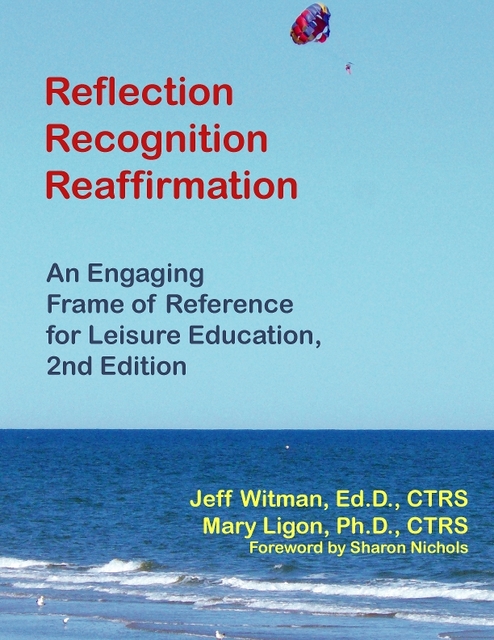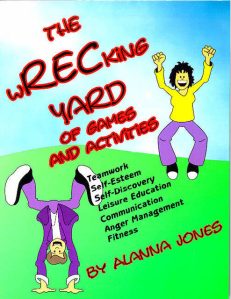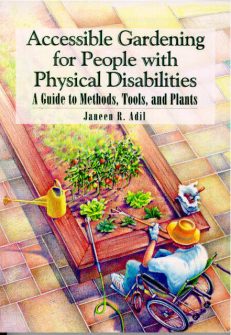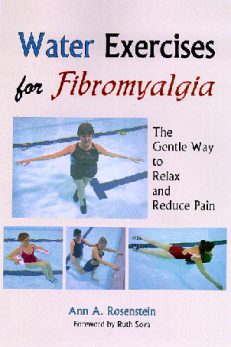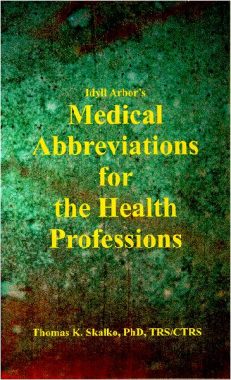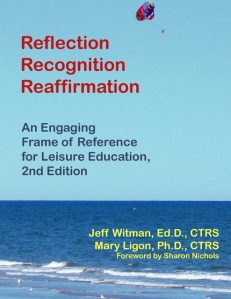Description
Reflection Recognition Reaffirmation: An Engaging Frame of Reference for Leisure Education (2nd Edition) is a practical handbook for implementing leisure education programs with a variety of populations in varied settings. Each chapter provides numerous clearly defined activities that can be easily incorporated into programming.
The notion of a sequential approach (Reflection Recognition Reaffirmation) represents a process in which program participants move from contemplation to action in creating more positive lifestyles. First, participants are engaged in experiences that encourage them to consider leisure as something with unique meanings to them (Reflection). Next, they’re involved in activities that allow for some clarification of the role of leisure in their lives (Recognition). Finally, participants are asked to consider where they want to go with what they’ve learned about themselves (Reaffirmation).
In addition to The Three Rs, further chapters highlight the role of leisure education when addressing Social Skills, Stress Management, and Senior Activities. This book includes helpful information on assessment and program development. Sample programs are provided.
This book is a practical resource for activities and a source of inspiration and motivation for those implementing leisure education programs.
Authors
Jeff Witman, EdD, CTRS
Jeff Witman is Chair of the Behavioral Science Department at York College of Pennsylvania. Jeff’s experience with the development and leadership of leisure education programs includes:
* inpatient behavioral health, drug/alcohol rehabilitation, and developmental disabilities programs;
* outpatient and day-treatment mental health programs;
* support groups for clients and for caregivers;
* a community-based program for seniors; and
* several alternative school, camp, and respite programs for children and youth with disabilities.
Academic influences on his development of leisure education programming include work with Chet McDowell at the University of Oregon (where Jeff got an MS) and Gerry Fain and Roxanne Howe-Murphy at Boston University (Jeff’s doctoral school). He also credits his great aunt Mary Strickler Sarver, a Red Cross Recreation Worker during and after WWII, with fostering a passion for "teaching people to fish rather than just giving them the catch of the day!"
Mary Ligon, PhD, CTRS
Mary Ligon is an Assistant Professor in the Behavioral Science Department at York College of Pennsylvania. Mary is a Gerontologist who specializes in psychosocial development in late life, and she has been a Certified Therapeutic Recreation Specialist for more than 25 years. Mary has had the opportunity to develop and utilize leisure education programs in a variety of settings including: in-patient psychiatry, physical rehabilitation, and long term care environments.
Mary became acquainted with the concept of leisure education as an undergraduate at Radford University. Under the guidance of Gerald O’Morrow and Lee Stewart, Mary adopted the Leisure Ability Model (Petersen and Gunn, 1984) as a framework for service provision. Mary has used the concepts of leisure education in working with clients across the lifespan, promoting leisure involvement as a way of getting the most out of life.
Reviewer Comments
I smile as I read the beginning pages of Reflection Recognition Reaffirmation. Dr. Witman and Dr. Ligon present useful leadership suggestions and program consideration. Their combined knowledge and skills are reflected in these suggestions. I recognize their contributions to therapeutic recreation. I reaffirm my support for their philosophy and activities that help improve the lives of our clients as each professional selects leisure education goals, activities, and techniques for their clients. I hope they do the same for themselves. Through leisure I become who I am. Throughout life, I change and adapt. Leisure can help us do both.
Nancy Navar, Re.D., CTRS
Reflection Recognition Reaffirmation is a new publication that really covers the field of leisure education, leisure activities, and retirement. This is a must publication to have if you are working in the field of Therapeutic Recreation with persons who are mentally ill, physically disabled, mentally handicapped, and aging. There are numerous excellent activities and resources to choose from when engaging your clients in the leisure education process.
Jerry Hitzhusen, University of Missouri
Reflection Recognition Reaffirmation by Jeff Witman and Mary Ligon provides practitioners with a valuable tool for implementing a leisure education program. Broken down into easy to understand chapters, the sequential approach allows for easy implementation. The exercises in the book can be used for a wide range of individuals in leisure education programs.
Mary Bourgeois CTRS
Leisure education is valuable for anyone and everyone seeking a better quality of life. While well planned, appropriate educational opportunities, in general, are beneficial for learners to obtain new knowledge and skills necessary for living, a solid background in leisure education provides the individual the means for successful, personally satisfying living (leisure) experiences. This second edition is a valuable contribution to the literature related to leisure education for both instructor and student. The text is easy to read and the activities that address various learning and behavioral goals are simple to facilitate. Most of the exercises illustrated in the book are useful for both educators and practitioners. This text is appropriate for disseminating ideas of leisure education for lots of different types of groups, age ranges, and cultural backgrounds.
Dr. Steve Langsner, University of Arkansas
This edition is a valuable resource to use with individuals with and without illnesses and disabilities, in a variety of delivery settings, and with clientele of all ages. Academics and practitioners will find the text relevant, practical, engaging, and well grounded in our professional theories and intent. This text advances the opportunity to engage in evidence- and theory-based practices. Within the text, and within each section of the text, hierarchical sequencing is evident. As a result of the text’s structure, protocols and formative evaluations are inherent. Throughout, helpful hints are given that survey content in each section and aid the facilitator in selecting experiences appropriate to intended outcomes. The authors reference resources and cite quotes that bring major points to the forefront. This text is supportive of academic classes like facilitation techniques, intervention processes, and leisure education. For professionals, the text presents client-ready interventions with clear protocols and evaluation options. The sensitivity and creativity of the authors are evident, as is their intent to encourage these qualities in facilitators and the helping relationship. The concluding sections of the text, assessment, program development, and program examples, explicitly tie the helping relationship with the APIE process and support a comprehensive approach to intervention.
Organization of the text reflects logical sequencing in a number of ways. The core elements of the text, reflection, recognition, and reaffirmation, present an ordered path to change. Experiences within these categories and the remaining subdivisions are sequenced from introductory to mature. For example, stress management commences with identification of positive and negative stressors and concludes with the realities of a perfect day. Sequences of experiences in each section support the behavioral hierarchies — cognitive, affective, social, and sensory-motor. Finally, each experience is organized and presented succinctly. From the goal statement, to delivery format, and concluding with processing, a facilitator is presented with a session protocol and formative evaluation process.
Complexity of the material is minimized from the directions for each experience (goal, format, processing) to the description for worksheets and necessary handouts: And along with the sequencing of experiences in each section, consistency in practice is encouraged. The use of this text, therefore, presents the facilitator with a protocol to bring uniformity to intervention sessions. Further, by documenting types of information shared during the processing phase of each experience, facilitators are engaging in formative evaluation that allows for evidence-based practices. As suggested by Sharon Nichols, the text is grounded on models of change. Together with the leisure education concepts outlined by the authors, the use of this text results in theory-based practices.
Marcia Jean Carter, Re.D., CPRP, CTRS, Western Illinois University
Reflection Recognition Reaffirmation brought me up to date with current trends in leisure education. Working with a non-verbal population (intellectually disabled) I have not provided these services to the extent I should. This book inspired me to refocus my role in assisting people in attaining an independent leisure lifestyle to the greatest extent possible. The book is written in a user-friendly format and provides the reader with updates on the core elements of leisure education. The alignment of core values in providing quality services is a major concentration in this textbook. The reader can reflect on how the activities will assist participants to learn not only about their personal leisure interests, but to understand why leisure is important for their health.
As I studied the worksheets, I was able to consider implementation of the activities to meet the needs of the population I serve. The index is concise and helpful in finding topics. The exercises and activities are appropriate for the material and match in terminology and scope. The activities can be customized to fit your needs. Each activity has the components of goal, format, and processing. After reading the text I am excited to put the information to use.
Jo Ann Ripp, Recreation Therapist, Central Wisconsin Center for the Developmentally Disabled
Dr. Jeff Witman and Dr. Mary Ligon describe the core principles of leisure education in the best way that I have seen it. Reflection Recognition Reaffirmation is a book for educators, students, and practitioners alike. Everything is presented to the reader in a short practical style where you can see progression of program development to easily tailor it to a specific person. Some of the activities included are tried and true for me, others I can’t wait to use! Activities are laid out to where you can find what you need quickly and easily, to use again and again. This is not a book that will just sit on your shelf!
Kim Epley, MS, LRT/CTRS
To Recreational TherapistsLicensed Recreational TherapistsTherapeutic Recreation SpecialistsRecreation Professionals in the USA; those Health and Human Service related Professionals employed throughout the World: If you need a myriad of possibilities to stimulate your stakeholders to think earnestly and honestly about leisure, time, and what highlights the quality of their every-day existence, this text would be your best buy!
Jesse A. Mann, Ed. D, LRT, CTRS
Delightful! Witman and Ligon’s second edition of Reflection Recognition Reaffirmation: An Engaging Frame of Reference for Leisure Education provides both a rationale and a useful reference for recreation therapists. Early in the book, the authors accurately include a disclaimer informing us that many of the activities may be familiar or a variation already known. Witman and Ligon have succinctly integrated the essence of 1) stages of the change process, 2) group process, and 3) leisure education. And this merging of concepts with activities makes this book distinctive.
Using the three Rs as a framework provides the therapist:
* A reminder of the value of structuring a session, yet maintaining flexibility to your clientele’s current status
* Credibility for your sessions
* A safe environment for your clientele to address problem behaviors
* An environment for your clientele to express themselves non-verbally
In the preface, Witman referred to customizing programs. What a splendid way to say 1) person-centered approach or 2) individualized service delivery! This is his gentle reminder to us to continually adapt for meaningful sessions; vintage Witman.
If a recreation therapist has not incorporated the three Rs of leisure education — reflecting, recognizing, reaffirming — into a leisure education session, it is not recreation therapy. Enabling people to understand how their leisure impacts and/or reflects other aspects of their lives can be effectively achieved by using this book.
The authors offer numerous scenarios on a continuum, from elementary to complex. The power of simplicity should not be under-estimated. These seasoned therapists offer the busy professional clarity, meaning, and order.
Angela Vauter, EdD, CTRS, East Stroudsburg University
We want our patients or clients to be healthy and safe. As a Recreational Therapist it is important to have resources to assist with developing a program to enhance learning for the patient or client. Leisure is an important part of our life that is easily forgotten during times of depression. Using the activities in this book will provide information to help remind the patient or client of old leisure activities or spark an interest for a new activity. Increasing knowledge about positive leisure activities will enhance a patient’s or client’s life. A person’s leisure is something they have control over and it provides a variety of benefits. We all have different ways of learning and this book provides a variety of teaching tools to share with the patient or client. This will assist with developing a program to fit the patient’s or client’s needs.
Tabitha Matthews, CTRS, Mineral Area Regional Medical Center
In the second edition of Reflection Recognition Reaffirmation, Jeff Witman and Mary Ligon provide activities that can be used with a variety of clients, thus making this a useful tool for all practitioners from entry-level to advanced. As a textbook, this book can help students learn how to facilitate leisure education sessions.
Kari Kensinger, PhD, CTRS, Grand Valley State University

